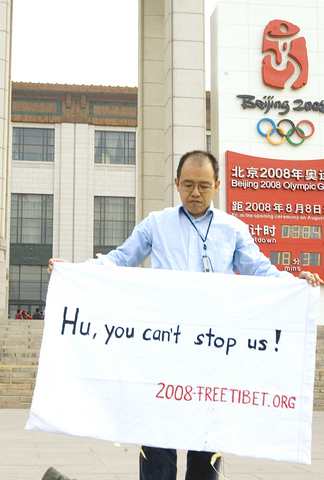A campaigner for Tibetan self-rule unfurled a banner yesterday near Beijing's Tiananmen Square and then escaped by bicycle, pulling off a rare protest as police patrolled to prevent demonstrations during the annual meeting of parliament.
Wangpo Tethong pulled the banner from his backpack reading "Hu, you can't stop us" in an apparent reference to Chinese President Hu Jintao (
The protest drew no response from the roughly dozen security officers in the area or the scores of tourists milling around.

PHOTO: AP
Shortly after Tethong's protest, a young man who ran across the square shouting in what was an apparently unrelated protest was quickly tackled by about six police officers, bundled into a car and taken away.
A 15,000-member force is on duty outside the meeting of the National People's Congress (NPC) to guard against protests by laid-off workers, farmers with land disputes and others hoping to draw attention to their grievances during the 10-day legislative session.
Since the NPC session began on Sunday, dozens of small-scale protests have been broken up. In almost every case, it has been impossible to tell what the people were protesting about because they have been taken away so quickly.
In a brief interview moments after the protest, Tethong said his protest aimed to express Tibetan aspirations for self-determination.
"I am angry and frustrated to see that Tibetans for more than 50 years are denied their freedom and the right to determine the future for themselves," said Tethong, who is of Tibetan descent but based in Switzerland and is a member of the International Tibet Support Network.
Tethong's whereabouts after the protest were not known.
Meanwhile, Amnesty International yesterday called for the release of at least 10 Chinese activists who were apparently detained by police weeks ahead of the annual meeting of the NPC. Those held include AIDS activist Hu Jia (

‘WIN-WIN’: The Philippines, and central and eastern European countries are important potential drone cooperation partners, Minister of Foreign Affairs Lin Chia-lung said Minister of Foreign Affairs Lin Chia-lung (林佳龍) in an interview published yesterday confirmed that there are joint ventures between Taiwan and Poland in the drone industry. Lin made the remark in an exclusive interview with the Chinese-language Liberty Times (the Taipei Times’ sister paper). The government-backed Taiwan Excellence Drone International Business Opportunities Alliance and the Polish Chamber of Unmanned Systems on Wednesday last week signed a memorandum of understanding in Poland to develop a “non-China” supply chain for drones and work together on key technologies. Asked if Taiwan prioritized Poland among central and eastern European countries in drone collaboration, Lin

The US government has signed defense cooperation agreements with Japan and the Philippines to boost the deterrence capabilities of countries in the first island chain, a report by the National Security Bureau (NSB) showed. The main countries on the first island chain include the two nations and Taiwan. The bureau is to present the report at a meeting of the legislature’s Foreign Affairs and National Defense Committee tomorrow. The US military has deployed Typhon missile systems to Japan’s Yamaguchi Prefecture and Zambales province in the Philippines during their joint military exercises. It has also installed NMESIS anti-ship systems in Japan’s Okinawa

The Chien Feng IV (勁蜂, Mighty Hornet) loitering munition is on track to enter flight tests next month in connection with potential adoption by Taiwanese and US armed forces, a government source said yesterday. The kamikaze drone, which boasts a range of 1,000km, debuted at the Taipei Aerospace and Defense Technology Exhibition in September, the official said on condition of anonymity. The Chungshan Institute of Science and Technology and US-based Kratos Defense jointly developed the platform by leveraging the engine and airframe of the latter’s MQM-178 Firejet target drone, they said. The uncrewed aerial vehicle is designed to utilize an artificial intelligence computer

Renewed border fighting between Thailand and Cambodia showed no signs of abating yesterday, leaving hundreds of thousands of displaced people in both countries living in strained conditions as more flooded into temporary shelters. Reporters on the Thai side of the border heard sounds of outgoing, indirect fire yesterday. About 400,000 people have been evacuated from affected areas in Thailand and about 700 schools closed while fighting was ongoing in four border provinces, said Thai Rear Admiral Surasant Kongsiri, a spokesman for the military. Cambodia evacuated more than 127,000 villagers and closed hundreds of schools, the Thai Ministry of Defense said. Thailand’s military announced that